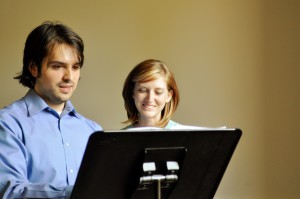 The principles below I found when I started reading “The Radiant Performer” by Wesley Balk. When I first started practicing singing on my own (at age 13 way before reading this book) I had no idea how to go about practicing to make sure it was fun. The key to success in singing is knowing how to have fun with it. Why? Because when we have fun we’re more likely to try something new, our muscles tend to let go, and we tend to be in the present (all INCREDIBLY helpful things for learning how to sing) The muscles and cartilidges in and around your larynx (voicebox) function best when they aren’t being squeezed by unneccessary tension. If we’re in the present, we can notice and release unecessary tension, and that feels more comfortable and sounds better and as a result, it’s fun. Using the principles of behavior modification in your practice, you can keep yourself from getting frusturated. I can’t remember the last time I practiced singing and didn’t enjoy it, and some of the credit definitely goes to these principles. You can use these not only in singing, but in any area that you want to change your habits for the better. Enjoy!
The principles below I found when I started reading “The Radiant Performer” by Wesley Balk. When I first started practicing singing on my own (at age 13 way before reading this book) I had no idea how to go about practicing to make sure it was fun. The key to success in singing is knowing how to have fun with it. Why? Because when we have fun we’re more likely to try something new, our muscles tend to let go, and we tend to be in the present (all INCREDIBLY helpful things for learning how to sing) The muscles and cartilidges in and around your larynx (voicebox) function best when they aren’t being squeezed by unneccessary tension. If we’re in the present, we can notice and release unecessary tension, and that feels more comfortable and sounds better and as a result, it’s fun. Using the principles of behavior modification in your practice, you can keep yourself from getting frusturated. I can’t remember the last time I practiced singing and didn’t enjoy it, and some of the credit definitely goes to these principles. You can use these not only in singing, but in any area that you want to change your habits for the better. Enjoy!
Practice Navigation Principles
1. Let each new step in the learning process be small enough so that you’re likely to succeed.
When working with a new exercise (or any exercise for that matter) be nice to yourself. So take one step at a time, and break each step into small steps if needed. If we attempt to make the journey in a few giant steps, we may lose our footing and miss the journey altogether.
2. Learn one thing at a time. Don’t try to learn two things at once.
This is an easy thing to forget when learning healthy vocal technique. Just like juggling, you don’t jump to juggling 5 balls at once, but start with one and progress. In singing we’re learning new habits and after learning them separately we combine them all at once. So we gently remind ourselves of this guideline continuously. Learning singing is a lot like learning to write as a child, only a lot easier and more fun. You learn the letters, then how the letters sound, then how they make words, and then you get to a point where you just think with a pen in your hand and out comes paragraphs. So in singing we learn lots of small but very helpful habits that come to replace unhelpful habits, we practice combining these habits in our songs and practice, then in performance we rely on our muscle memory and have a good time.
3. Put the most recently learned step on a variable schedule of reinforcement
Once you’ve learned a particular exercise and can do it easily, don’t practice it to the point of mindless repetition.
With mindless repetition comes unawareness, with unawareness comes default mode, and with that mode comes old unhelpful habits. Ten minutes of mindful practice is worth and hour of mindless practice. That being said, if you practice the same exercise over and over again, with no variations on the exercise, it becomes difficult to practice mindfully, so, if you find yourself spacing out after a lot of time spent on a single exercise, stop, take a break, or move to a different exercise. This also is important for your overall singing in general: if you’ve spent a long time practicing during a given day, and you find yourself losing focus, stop practicing, and congratulate yourself for what you’ve done for the day. Then continue the following day.
4. When taking a new step, don’t worry about getting the old steps right.
This guideline is inter-dependent with the second guideline. Eventually, when singing, you’ll be applying a lot of helpful habits at once: a flexible tongue that doesn’t pull back, a passive jaw, an efficient breath, etc. So let’s say you’ve learned a song really well, and you love the way you’re sounding, but now you want not just sing it, but express facially the emotions of the song. During your first attempt practicing this, you might forget a few things, like the words or miss a few pitches. Don’t panic or judge yourself, this is completely normal. Once you have enough experience expressing the emotions of a particular song, you’ll find that everything else you’ve learned falls back into place.
5. If you are a teacher, stay a step ahead of your student.
This one applies to me, but you play a very critical role. If I’m moving too fast, or not fast enough, communicate with me. For peak performance, there is a comfort zone or pace in which to challenge oneself. Above the comfort zone is a panic zone, where one is over-challenged and peak performance is stifled. Beneath the comfort zone is the drone zone, where under-challenging fails to stimulate the greatest possible development. We work together to keep you at your ideal zone.
6. If one procedure, exercise, or guideline doesn’t seem to be working, try another.
7. Don’t interrupt a practice session gratuitously.
Don’t interrupt the learning and practicing process so much that you can’t get a momentum going. When you’re finished practicing, then reflect, with self-compassion, attention to details, and self-encouragement. This also applies more specifically in singing; don’t analyze your singing while your singing, instead record yourself and make observations of your singing when you can truly put all your energy into listening (instead of trying to listen to yourself and sing at the same time).
8. If learned steps fall apart and nothing is working, review all the steps leading up to that point.
Go back to basics, or wherever you last remember the thing that was working.
9. Quit while you’re ahead.
